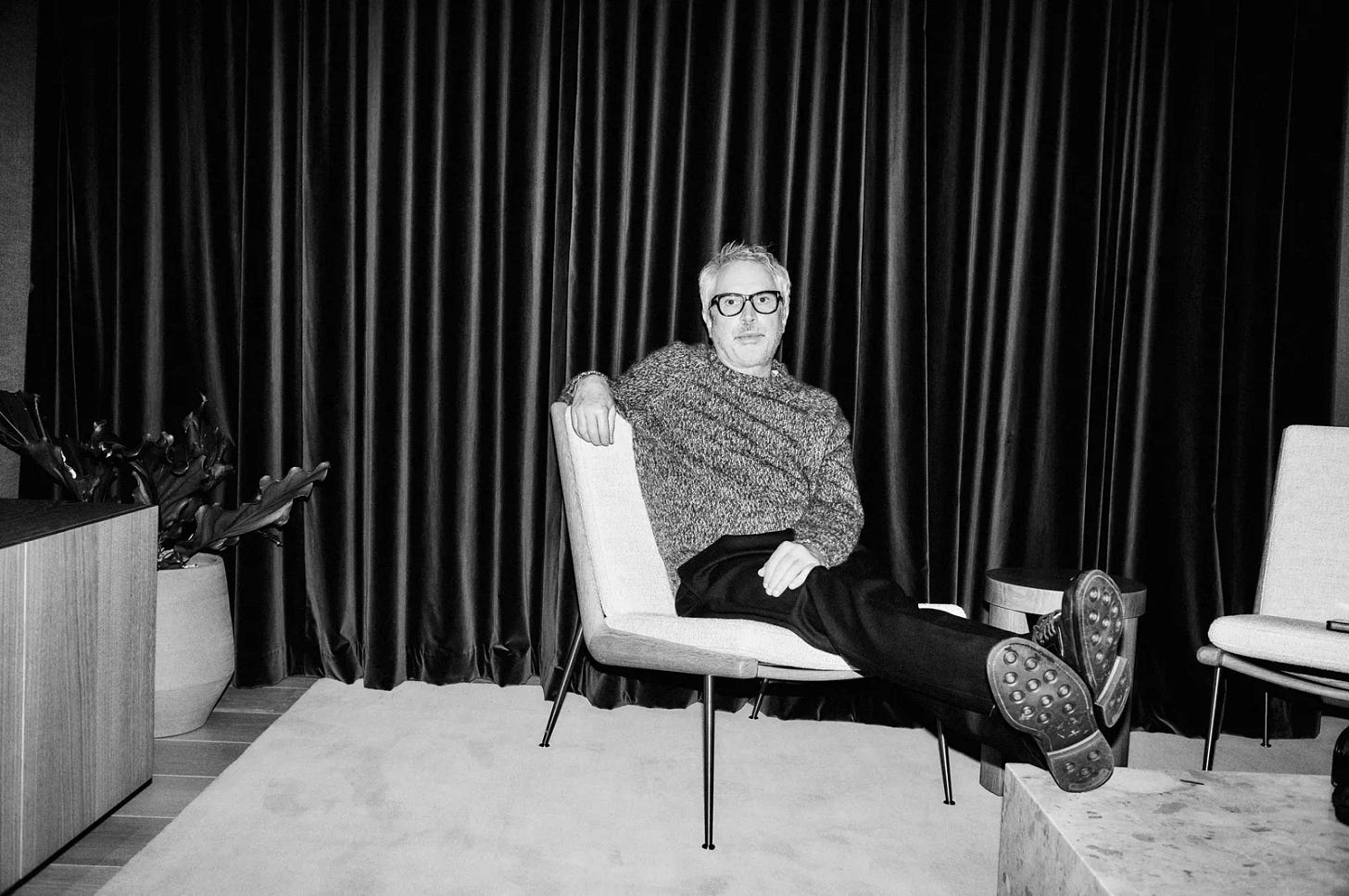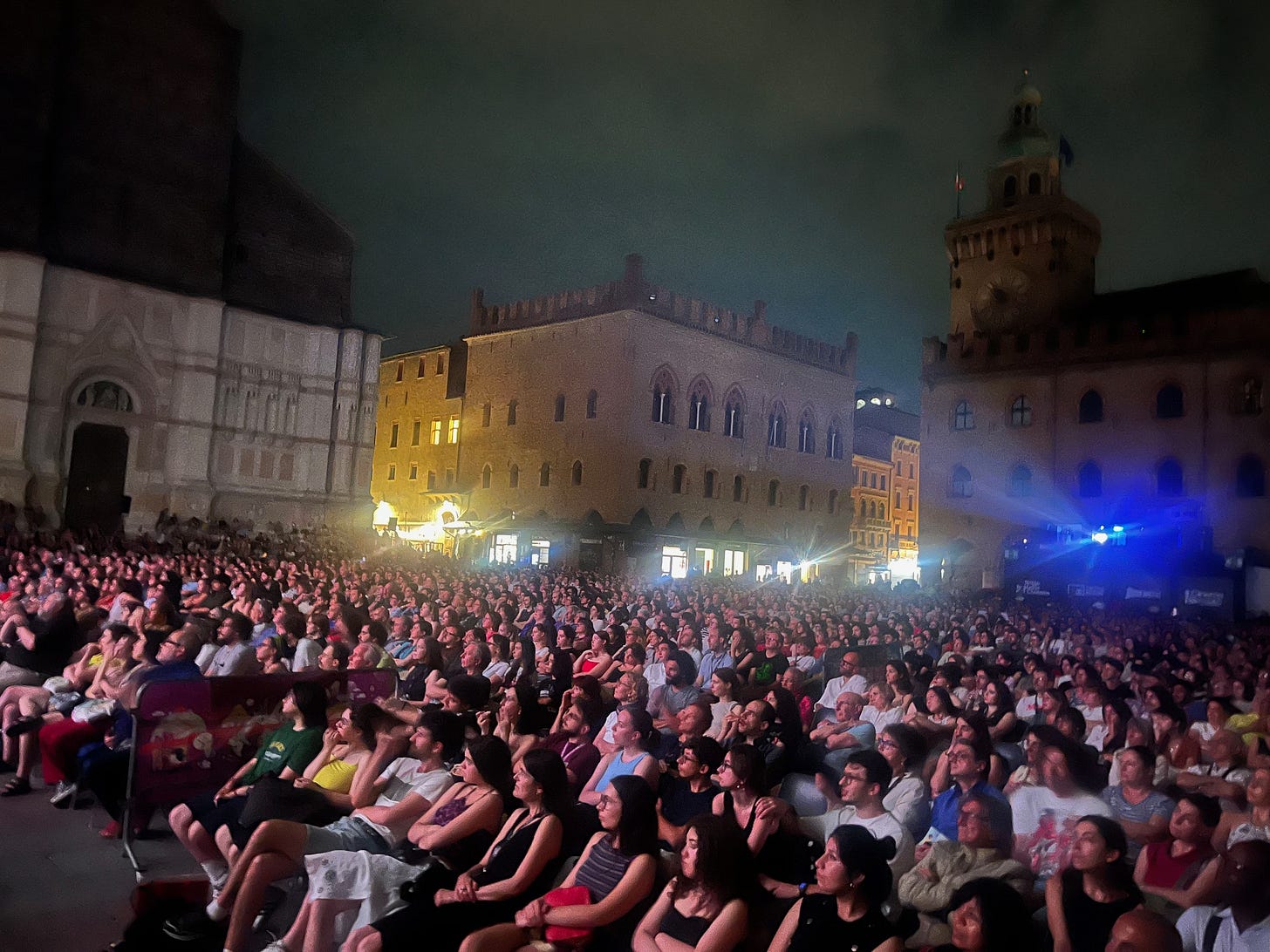multi-storied #38: Cinema, cinema
Let me say, up front, that I’ve always been underwhelmed by journalism’s intersection with the cinematic-industrial complex. Usually the CIC will cloak itself in all manner of PR and discretion, but it will conveniently unbend every time a CIC figure has a new movie out. At that point, the director or actor will be offered up on a salver for an “interaction.” Journalist and star will interact in an environment of just UTTER artificiality, in which they will pretend to be friends and pretend to be honest with each other, all the while knowing that the star is really only there because they have a movie to plug and the journalist is really only there at the sufferance of the star. Once the interaction is over, the CIC zips itself up once again. This intersection results in many, many truly dreadful “profiles” and only few good ones. (Here’s one of the latter, a thoughtful examination of the French filmmaker Mati Diop, on the even of the US release of her documentary “Dahomey.”)
Part of the problem is the moment at which these interactions occur: when the creative and technical process, which is really the interesting bit, is all finished. The journalist has seen some kind of rough or finished cut, and the star is perhaps in the mood to reflect on their work — but the reader has seen nothing, and is therefore only given approximate descriptions of an unreleased work and all the talk-talk swirling around that work. The life cycle of a movie is long, and the CIC doesn’t often grant admittance in a film’s formative stages. Just before “Killers of the Flower Moon” came out, through the good graces of David Grann, I got a degree away from Martin Scorsese to ask if a profile of the master at work on his next movie might be possible. Um, not really, I was politely told. It didn’t fall under their remit at that moment, which was: “Killers of the Flower Moon.”
All of this has stymied me for a while, because god knows I want to write about film (although perhaps not in this way). How could I not? I used to be a film critic, reviewing two movies a week, back in the day; I watch scores and scores of them every year; this year, our annual holiday was a fortnight in Bologna, attending Il Cinema Ritrovato, the festival of old and restored movies. (See photo below.) My secret desire is that some Criterion editor is reading this newsletter and will commission me to write an essay for one of its DVD releases.
, if you’re reading this — I haven’t given up!Anyway, at some point this past summer, thanks to WIRED, the CIC came to me — not really to do a profile, but an interview with the remarkable Alfonso Cuaron. (The occasion was the release of his TV show “Disclaimer,” which is now on Apple TV.) The format was initially something of a relief. I didn’t have to dance the dance of the CIC profile, the kind in which I’d pretend to know the man intimately based on six hours of conversation. Then the format was NOT a relief, because it turned out the thing would be filmed and uploaded for posterity. This paid no consideration to the fact that I prefer to be on the viewing side of things, but apparently it was not negotiable. So here, with some trepidation, is the video. Watch it when you’re in a kind mood.
And here’s the interview as published.
Talking to a filmmaker for WIRED, a tech magazine, was an intriguing exercise. Cuaron has directed a couple of films that may, I suppose, be described as science fiction, but it turns out he himself doesn’t see them as belonging to that genre. That foreclosed the tech angle. We talked about “Disclaimer” quite a bit, and about the film industry. But there was also some geeking out about movies, which didn’t totally fit WIRED’s core interests. So for you, dear reader, some details mined from the rich seams of the CIC:
On watching movies:
Cuaron: Most of the masters I watch now—unless I’m very lucky to be in a festival or a rare revival someplace—I watch on my home system. I’m talking about Billy Wilder [or] Lubitsch. One big problem is of the archive. Even if you’re lucky and have your film in theatres, how long will it last on those screens? Three months? And then it goes to a streaming or digital format, so the next generation is going to know the work of these people through digital media, right? Like: It’s very likely that young people have seen Y Tu Mama Tambien—if they have seen it—on a Blu-Ray.
Where I have a big problem with these [streaming] platforms is that they just throw their titles in as what they call their content, without any love for archiving what they have, without any organization, making it so hard to find. There are so many masterpieces in all the different platforms, all of them hidden, because to find them is a nightmare. And it would be amazing if they would take the responsibility of being respectful with cinema, and archive them properly. You could open a page of European cinema, and then you could choose a period, or you could choose a nationality or a specific filmmaker. That [ability] doesn’t exist.
On time in the movies:
Cuaron talked about holding the shot, and the conversation drifted to how some of the Italian neorealists sometimes stay with their scenes for a few seconds beyond the main action. The star would buy her train ticket and then leave the frame, but the camera would stay at the railway station’s ticket window to capture some of the other characters and action, just to let the world develop and breathe.
Cuaron: The Neorealist films you’re talking about, there was a big preoccupation of the place of each one of the characters in a specific historical and social moment. Allowing the characters to drift out of the frame and staying with the environment was a part of that. Those films convey the social dilemmas that are going on.
Interviewer: The same thing happens even in Perfect Days, more recently.
Cuaron: And by the way, that is not fighting with time. It’s another measurement of time. That expanded time of Wim Wenders is not fighting with the narrative. It’s integral to the narrative. In TV also, there are examples where they’ve done it in a beautiful way. Bergman with A Sense of a Marriage. Fassbender with Berlin Alexanderplatz. David Lynch with Twin Peaks.
On John Ford’s The Searchers:
I love the form: watching it, and the narrative—all of that, Ford is amazing. But there is one thing that betrays his intentions. Which is how a Native American woman is just for comic relief, and when she’s kicked, it’s supposed to be a subject for laughter. There’s no other commentary—it’s just for entertainment. And I’m like “You fucking racist!” It spoiled the whole thing for me. The rest of it, I admire so much. The lesson of the stupid kind of TV these days is that it’s a language of close-ups and talking heads. In The Searchers, there is one close-up. One single close-up.
On the language of cinema versus TV:
In film, you can take images and put them in relationship with other images, [and thus] you convey a meaning. Sometimes—and I’m not saying all of them—but sometimes, many TV series cannot be concerned about that. They need to keep moving the narrative forward constantly, and the narrative is leading the show. It’s like what Hitchcock says in one interview—he was discussing how people talk about the content of a film, and he says: I don’t care about the content. I care about the form and the style. A painter is not concerned if the apples he’s painting are rotten or not. What is going to convey meaning is every gesture of the painter, the amazing execution, the style and the form in which he does each one of those apples. That’s Hitchcock’s point of view.
The language in cinema has a greater value and a greater weight in the final experience of a film. There are two principles that are contradictory, and I learned these by working on this show. The principle of film is time—is how images flow in time, and all the emotions that they convey in time. And by time, I’m not saying you have to expand time like Bela Tar. But it’s how you compress time. Hitchcock is a perfect example. Spielberg’s Duel is, like, a compression of time. Television, on the other hand, is about killing time. It’s killing time to keep the narrative flowing.
The published interview with Cuaron is here, dear Criterion editor.





